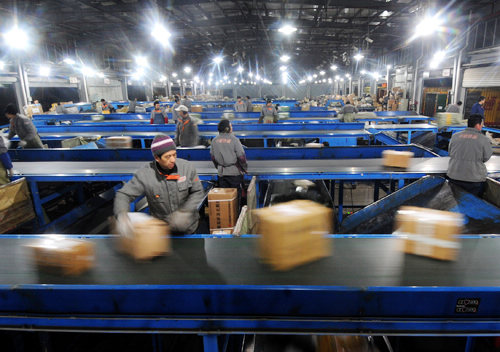|
 |
|
FAST MOVING: Workers transfer packages at STO's east China center in Hangzhou, capital of Zhejiang Province (HAN CHUANHAO) |
With more Chinese customers abandoning bricks-and-mortar department stores in favor of online alternatives, express delivery services have sprouted up in recent years, riding the heels of the online shopping craze. Unfortunately for customers, delivery companies are renowned for providing unreliable service, sparking consumer ire and quickly becoming the bane of most netizens' online shopping experiences.
Add to that rising fees. In December 2011, Shanghai-based ZTO and Yunda announced increase in delivery fees by 1 yuan, citing operational costs to improve services for the increases.
China's express delivery industry is known for its two "lows": low prices, but low service quality. And increasing prices do not guarantee better service, said Xu Yong, President of Cecss.com, an express consulting website based in Shanghai.
Fees and false promises haven't been customers' only complaints for the country's express delivery industry. Delivery delays, missing purchases and unregulated charges have also caused customer confidence to sway, said the State Post Bureau (SPB). Lack of delivery services during peak seasons has also sparked customer discontent. In November 2011, complaints went up almost 60 percent from the previous year.
Now, as express services become a daily necessity with the rising popularity of online shopping, the government is looking to enhance the booming, yet disorganized, industry.
According to the SPB, China had 5,883 licensed express firms by the end of 2010. Among them, only six had annual revenue exceeding 2 billion yuan ($317.5 million) and two had more than 10 billion yuan ($1.59 billion).
"Obviously, the situation of China's express delivery industry is still in its infancy. In the United States, the top couriers had the market share of 95 percent," Xu said.
The market also has a lower access threshold for private express companies—all that's needed for a startup is a phone line, several couriers and an electric bike—resulting in a soaring number of express enterprises and blind expansion, according to a report released by Zero2IPO Research Center.
Most private delivery firms are franchisees, said Xu. It is hard to regulate the service quality of franchisees.
Xu suggested that a viable way for delivery firms to improve service and foster brands is to revoke the franchise and establish proprietary branches under their direct control.
The SPB in June 2011 announced suspensions for 56 unlicensed express enterprises, mostly franchised outlets of the country's four major express delivery networks: ZTO, STO, Yunda and Yuantong.
Meanwhile, on August 30, the SPB created the country's first rating standard for express delivery companies.
The standard divides express delivery companies into four grades, from two star to five star, based on their size, coverage, market share, IT application level and service quality.
"The standard is very important. On the one hand, it can regulate express delivery companies and improve their services. On the other, it urges companies to rise above the current cycle of low-price competition with similar services," said Qi Hui, an analyst at market research firm China Express Consulting.
The SPB has already stepped in. On August 11, it issued a set of regulations to standardize operation of express delivery business. It aims to regulate the problems existed in the country's express delivery service, such as rough handing, delay and loss, said Xu.
On the last day of 2011, the SPB released its 12th Five-Year Plan (2011-15) for the express delivery industry. Strengthening the industry, fostering strong enterprises and creating stronger brands were among the main targets for the industry.
| 